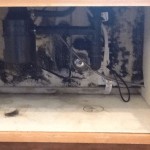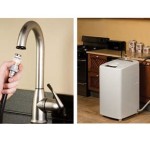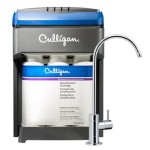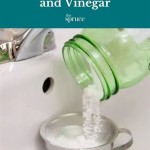Bad Smell Under Kitchen Sink
A foul odor emanating from beneath the kitchen sink is an unpleasant and potentially hazardous issue. This odor can stem from various sources, ranging from food debris to plumbing problems. Addressing the underlying cause promptly is crucial to eliminate the stench and prevent further damage.
### Identifying the SourceDiagnosing the source of the bad smell is the first step towards resolving the issue. Consider the following potential culprits:
*Food Debris:
Leftover food particles or spills can accumulate on the sink, drain, or disposal, attracting bacteria that produce unpleasant odors. *Clogged Drain:
Obstructions in the drain, such as grease, hair, or soap scum, can trap water and food particles, leading to a breeding ground for bacteria. *Leaking Pipes:
Deteriorated or loose pipes can leak water, creating a moist environment that promotes bacteria growth and a musty smell. *Garbage Disposer:
Food particles that get stuck in the disposer can decompose and release foul odors. *Mold and Mildew:
Moisture buildup under the sink can create a suitable environment for mold and mildew, which emit a characteristic musty scent. ### Resolving the IssueOnce the source of the odor has been identified, appropriate measures can be taken to eliminate it:
*Clean Food Debris:
Regularly clean the sink, drain, and disposal to remove any food debris. Use a dish soap solution and a brush to scrub away any residue. *Unclog the Drain:
Use a commercial drain cleaner or natural remedies like baking soda and vinegar to dissolve obstructions. Alternatively, a plumber may need to unclog the drain mechanically using a snake or auger. *Repair Leaking Pipes:
Inspect the pipes under the sink for any leaks or loose connections. Tighten any loose joints or replace damaged pipes to eliminate water leaks. *Clean the Garbage Disposer:
Run ice cubes or citrus peels through the disposer to grind up and remove stuck food particles. Alternatively, use a commercial disposer cleaner. *Remove Mold and Mildew:
Apply a bleach solution or a mold-killing spray to affected areas. Allow the solution to sit for the recommended time and then wipe it away. To prevent recurrence, ensure proper ventilation and minimize moisture buildup. ### PreventionTo minimize the risk of bad odors under the kitchen sink, follow these preventative measures:
*Regular Cleaning:
Regularly clean the sink, drain, and disposer to remove food debris and prevent buildup. *Use a Sink Strainer:
Install a sink strainer to catch food particles and prevent them from entering the drain. *Run Hot Water:
Run hot water through the drain regularly to flush out any grease or soap scum that may accumulate. *Avoid Pouring Grease Down the Drain:
Grease can solidify and clog the drain, leading to a foul odor. Dispose of grease properly by pouring it into a sealed container and discarding it with the trash. *Check for Leaks:
Periodically inspect the pipes under the sink for any leaks or loose connections. Repairing leaks promptly prevents water damage and odor development.
Why Is There A Smell Under My Sink

Stinky Sink Here S What Causes A Foul Drain Smell

Why Does My Kitchen Sink Smell Like Sewer Mike Diamond

How To Clean A Smelly Sink Youtube

How To Clean A Smelly Drain Easy Diy Fixes For Foul Odors

Sink Drain Bad Smells From Plughole Diynot Forums

Bad Smell Coming From Under The Rv Sink

How To Fix Smelly Sink Drains Using At Home Blockbusters

How To Get Rid Of The Bad Smell In Kitchen Sink

What To Do When Your Drains Smell Like Rotten Eggs Black Haak







